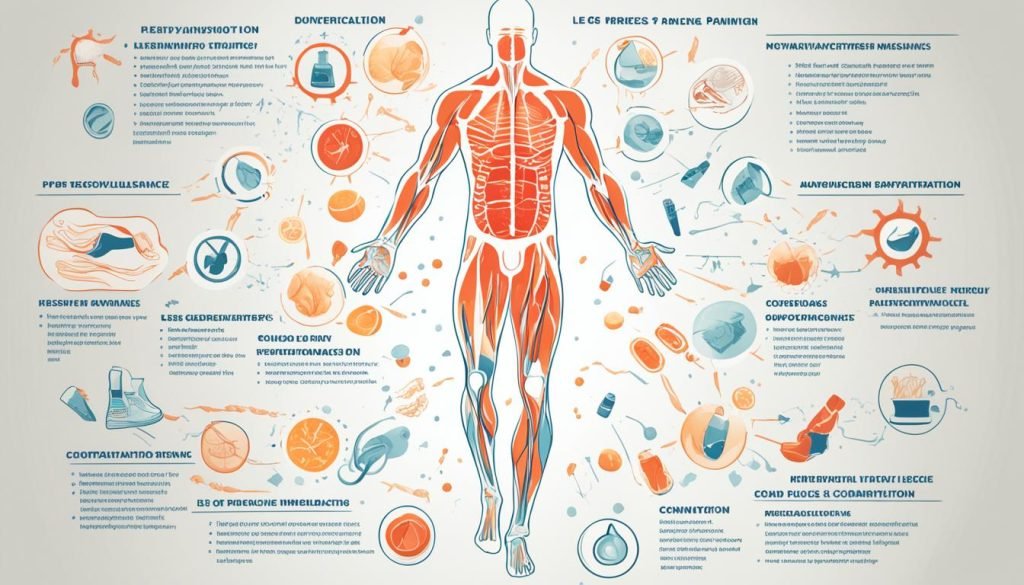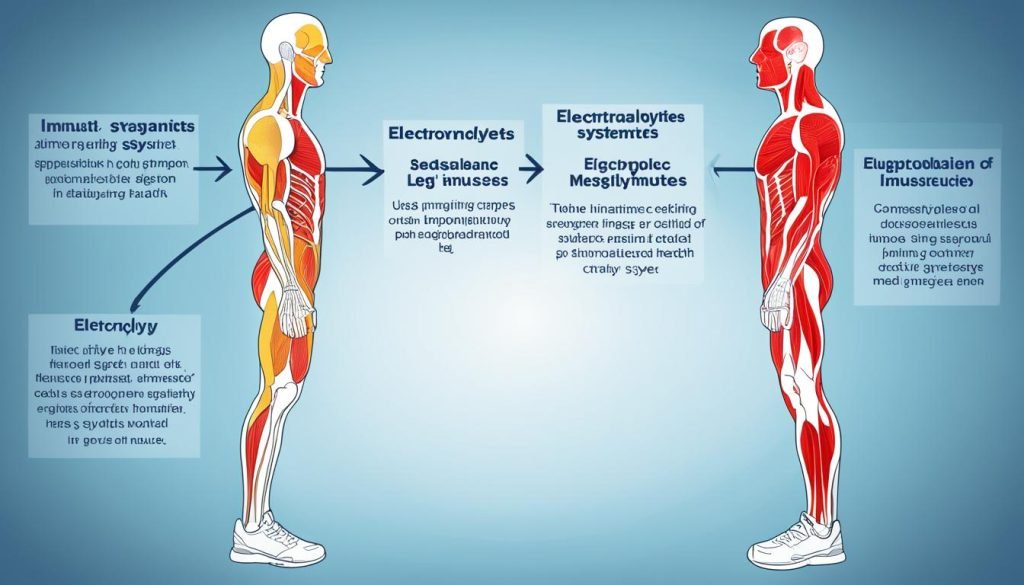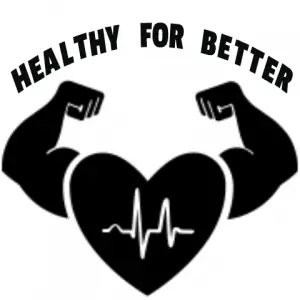Have you ever felt a sudden muscle cramp in your leg? It can be painful and confusing. Muscle spasms, also known as charley horse or nocturnal leg cramps, happen in the calves. They can be short or last for a while.
In this article, we'll look at what causes these muscle cramps. We'll see how dehydration, overexertion, and not having enough electrolytes can lead to them.
Key Takeaways
- Muscle spasms, often called cramps, can cause significant discomfort.
- Common areas affected include the calves and thighs.
- Dehydration plays a major role in the onset of leg cramps.
- Electrolyte imbalances can contribute to muscle health issues.
- Overexertion can lead to fatigue and increase the risk of cramps.
- Recognizing early signs of cramping can help in prevention.
- Understanding triggers is key to managing muscle cramps effectively.
Understanding Muscle Spasms and Cramps
Muscle spasms and cramps are common problems many people face. These sudden, involuntary muscle contractions can cause a lot of discomfort or pain. Knowing what they are and their symptoms helps in managing them better during daily life.
Definition of Muscle Spasms
Muscle spasms are sudden, involuntary muscle contractions. They often happen in the legs without warning. These contractions can be mild or severe, making it hard to rest or move.
Common Symptoms of Leg Muscle Cramps
Leg muscle cramps are known for sudden, sharp pain in the calf. People may also feel:
- Episodes of leg twitching.
- A sensation of tightness or hardening in the affected muscle.
- Discomfort that interrupts activities or affects sleep.
Knowing these symptoms is key to taking the right steps to reduce their frequency and ease the pain from muscle cramps.
Key Causes of Leg Muscle Spasms
Understanding why leg muscle spasms happen is key to stopping them. Overexertion is a big reason, especially during hard workouts. When you push too hard, your muscles get tired and may cramp up.
Dehydration also plays a role. Losing fluids, especially when it's hot, makes muscles work poorly. This can lead to muscle spasms because your body can't cool down or keep the right balance of salts.
Not getting enough nutrients like magnesium, potassium, and calcium can also cause muscle spasms. Eating the right foods is important for keeping your muscles healthy.

| Causes of Leg Muscle Spasms | Description | Potential Prevention Strategies |
|---|---|---|
| Overexertion | Intense physical activity that leads to muscle fatigue. | Gradually increase workout intensity. |
| Dehydration | Fluid loss affecting muscle function. | Stay hydrated before, during, and after exercise. |
| Nutrient Deficiencies | Insufficient intake of magnesium, potassium, or calcium. | Maintain a balanced diet rich in these nutrients. |
Dehydration and Its Role in Muscle Spasms
Dehydration greatly affects how muscles work, making spasms more likely. Without enough fluids, the body loses electrolyte balance, which messes with muscle activity. Keeping hydrated is key for muscles to work right, and not having enough fluids can make nerve signals go haywire, leading to muscle spasms.
How Dehydration Affects Muscle Function
Dehydration changes how muscles work in many ways. Here are the main points:
- Fluid Balance: Muscles need water to stay balanced and work well.
- Electrolyte Levels: Minerals like potassium and sodium help muscles get nerve signals. If these levels get out of balance, spasms can happen.
- Nerve Signal Disruption: Not drinking enough water can mess up nerve signals, making muscle cramps more likely.
Preventing Dehydration During Physical Activity
It's crucial to stay hydrated, especially when you're active. Here are ways to fight dehydration and stop muscle spasms:
- Drink water before you start exercising.
- Keep drinking water while you're active, especially in the heat.
- Use drinks with electrolytes to keep your electrolyte levels right.
- Watch how much you drink to make sure you're staying hydrated.
| Hydration Strategy | Benefits |
|---|---|
| Pre-Exercise Hydration | Prepares muscles for optimal performance. |
| During Activity Hydration | Prevents excessive fluid loss and maintains electrolyte levels. |
| Post-Exercise Recovery | Restores hydration, minimizing muscle soreness and spasms. |
Electrolyte Imbalance and Muscle Health
Electrolytes like potassium, calcium, sodium, and magnesium are key for muscle health. An electrolyte imbalance can mess with how muscles work. It can make muscles cramp up more often.
Not eating enough of these nutrients can make muscles more likely to spasm. Eating foods full of electrolytes is important for good muscle health. Here are some foods that have a lot of electrolytes:
- Potassium: bananas, sweet potatoes
- Calcium: dairy products, fortified plant-based milk
- Sodium: table salt, pickles
- Magnesium: nuts, spinach, whole grains
Eating a balanced diet helps avoid electrolyte imbalances and keeps muscles healthy. Paying attention to these nutrients can help prevent muscle cramps. This makes sure you stay comfortable and can keep living an active life.

| Electrolyte | Food Sources | Benefits for Muscle Health |
|---|---|---|
| Potassium | Bananas, Sweet Potatoes | Helps in muscle contraction and relaxation |
| Calcium | Dairy Products, Fortified Milk | Supports nerve function and muscle contraction |
| Sodium | Table Salt, Pickles | Regulates fluid balance and nerve signaling |
| Magnesium | Nuts, Spinach | Contributes to muscle relaxation and prevents cramps |
Overexertion and Muscle Fatigue
Overexertion can surprise people, especially during intense or long workouts. Pushing your body too hard can lead to fatigue, sore muscles, and even charley horses. It's important to know when you're overdoing it to keep your fitness journey on track.
Identifying Signs of Overexertion
Feeling too tired is a big sign you're overexerting yourself. If you're always sore or muscles cramp without reason, your body might not be recovering right. Dizziness or feeling irritable can also mean you need to slow down.
Managing Workout Intensity to Prevent Cramps
To avoid muscle cramps, increase your workout intensity slowly. This lets your muscles get used to the demands. Resting and stretching before and after exercise helps manage muscle fatigue. These steps reduce the chance of charley horses and keep your muscles healthy.
FAQ
What are the common causes of leg muscle spasms?
Leg muscle spasms can happen due to dehydration, overworking, or not having enough electrolytes. They can also be caused by muscle tiredness, poor blood flow, and certain health issues.
How do muscle cramps differ from regular muscle fatigue?
Muscle cramps are sudden, involuntary muscle contractions that hurt a lot. They are different from muscle fatigue, which is feeling tired and weak after working out.
What are nocturnal leg cramps, and why do they occur at night?
Nocturnal leg cramps happen at night and can be caused by not drinking enough water, not having enough nutrients, or sitting or lying down for a long time. They can make it hard to sleep and hurt.
How can I prevent dehydration during exercise?
To avoid dehydration when exercising, drink water before, during, and after your workout, especially when it's hot. Adding electrolytes can also help keep you hydrated.
What electrolytes are crucial for muscle health?
Important electrolytes for muscles are potassium, calcium, sodium, and magnesium. If these minerals are out of balance, it can cause muscle cramps and spasms.
How can I manage overexertion during workouts?
To avoid overexertion, slowly increase how hard you work out, take breaks, and stretch before and after exercising. This can help prevent muscle fatigue and spasms.
What role does poor circulation play in leg muscle spasms?
Bad circulation means not enough blood gets to the muscles, causing cramps or spasms. This is more likely to happen when you're not moving much or sitting in one spot for a long time.
Source Links
- Muscle Spasms and Cramps: What Causes Them? – https://my.clevelandclinic.org/health/diseases/muscle-spasms-muscle-cramps
- Muscle cramp – Symptoms and causes – https://www.mayoclinic.org/diseases-conditions/muscle-cramp/symptoms-causes/syc-20350820
- What Triggers Muscle Spasms and Cramps? – https://www.scripps.org/news_items/6374-common-triggers-for-muscle-spasms-and-cramps
Recent Posts
It's important to evaluate whether Beachbody On Demand continues to meet your fitness needs as we enter 2025. With a range of workout programs and nutrition plans, the platform claims to cater to...
Just like having a personal trainer at your fingertips, Beachbody On Demand offers you an extensive library of on-demand workout programs accessible anytime, anywhere. This service allows you to...

